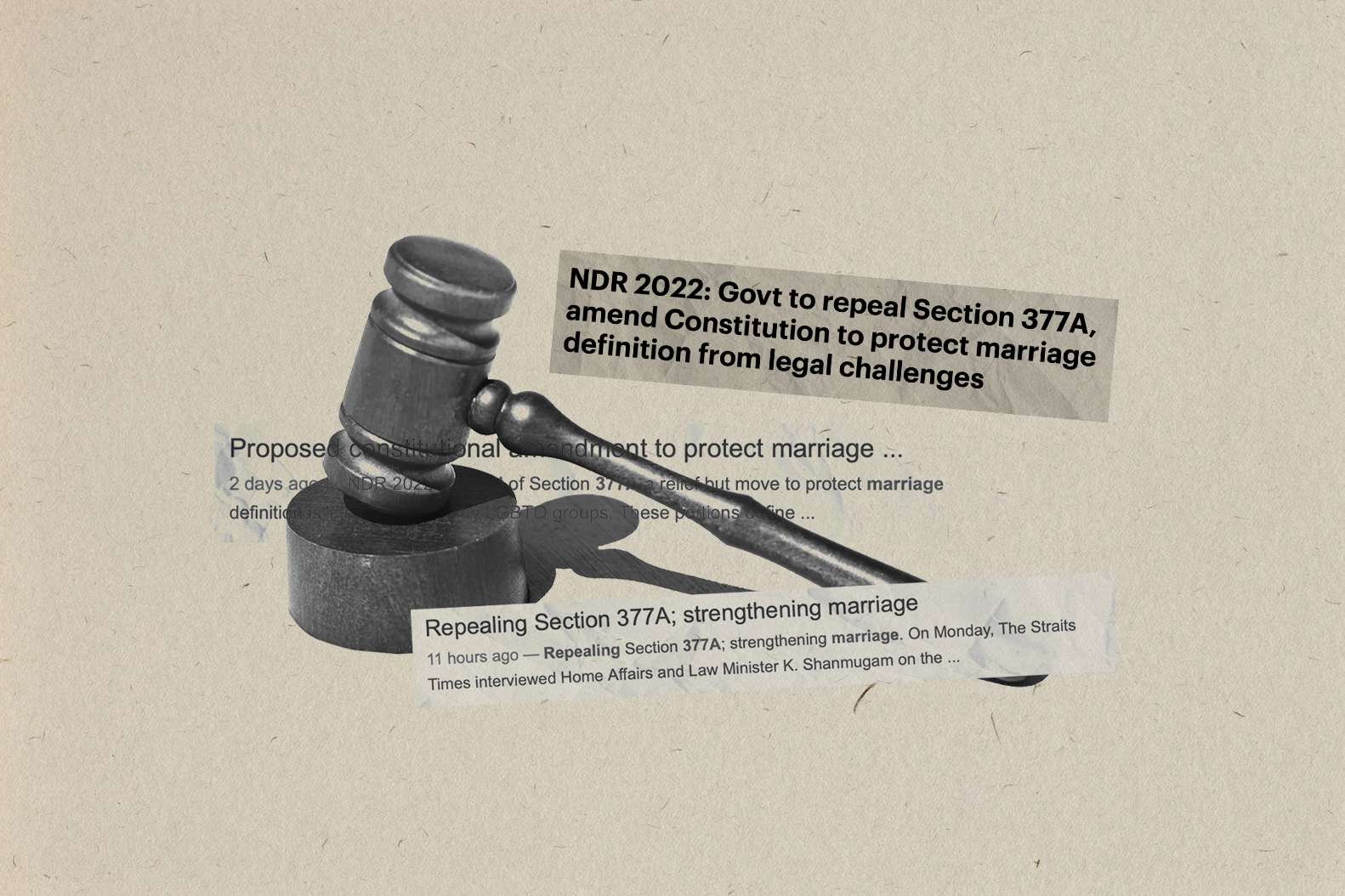Since the repeal of Section 377A was announced in Prime Minister Lee Hsien Loong’s National Day Rally speech on Sunday (Aug 21), various ministers have given more details on the steps that will be taken to safeguard the current definition of marriage.
Thir.st spoke to 2 lawyers who shared with us their concerns on how the proposed changes could affect schools, workplaces and homes.
But at the same time, beyond merely debating over policy, they urged believers to seize the moment to learn how to express God’s heart for humanity in a loving way.
Darius Lee, 34, lawyer and author
To my understanding, the changes to the Constitution that the Government has proposed are primarily aimed at preventing the definition of marriage from being challenged or ultimately decided by the courts.
The definition of marriage will still be able to be changed with a simple majority in a Parliamentary vote.
In my view, the best legal protection for marriage remains to enshrine marriage directly in the Constitution.
This means that a two-third majority of votes in Parliament will be needed in order to change the definition of marriage, rather than a simple majority (more than 50%), which is what the Government is likely to propose.

In Singapore, many laws and policies take reference from the definition of marriage (as a man-woman union) and the traditional family unit as the basic building block of society. These include housing policies, CPF, sexuality education, media content codes and more.
Apart from protecting the definition of marriage from legal challenge, the Government should also think about protecting all the laws and policies that are linked to marriage from such legal challenges (such as HDB housing policies).
For example, in 2021, a same-sex married couple successfully challenged Hong Kong’s housing policy when they argued that the definition of “family members” and “spouses” in the housing policy should include same-sex spouses. This was despite the fact that Hong Kong law recognises marriage as being between a man and a woman.
The court ruled that one’s heterosexual marriage status (if any) was not relevant to housing policy. In other words, the link between marriage and housing policies was cut.
However, laws and policies can only go so far. What matters is the “law written on our hearts” (Romans 2:15).
At the heart of debates over LGBT matters are differing ideas about human nature. These have implications on a range of matters including identity, relationships, communities, society and government.
The concept of gender identity rejects the link between a person’s biological sex and identity, whereas the concept of sexual orientation redefines the relevance of one’s biological sex to one’s sexual or romantic relationships.
These concepts are at odds with traditional views of human nature – including the Christian worldview – which emphasise how the differences between men and women are important to one’s identity and relationships, such as marriage and family.
“As Christians, we need to understand why God’s design for sex, gender, marriage and family are truly good…”
Even if Section 377A is repealed, debates over these topics will not go away. Activists have already called for numerous changes in many other areas of law and policy in various statements.
Thus, we will very likely encounter these different views again in debates over laws and policies including sexuality education, media content, same-sex marriage and parenting, transgender identities, transgender participation in sports and so on.

As Christians, we need to understand why God’s design for sex, gender, marriage and family are truly good, not only for ourselves, but also for all of humanity.
Ultimately, the only way that we can create lasting change is through the changing of hearts and minds. Laws and policies cannot satisfy the deep hunger and thirst within every human heart.
Everyone – whether they identify as LGBT or otherwise – has a profound longing for identity, belonging, meaning and purpose.
For Christians, we recognise that this is because we are created in the image of God, but are separated from God – who is the source of all things including our identity, belonging, meaning and purpose – by sin.
That is why Jesus Christ came to bring us the ministry of reconciliation and reconcile all things to God through the cross.
As Christians, we must always be ready and willing to speak the truth in love, and to persuade others in a winsome manner about the things which truly matter.
Jeremiah*, 34, lawyer, leads young adult ministry in church
The proposed Constitutional amendments are only to prevent court litigation to challenge the current legal definition of marriage. They do not entrench the definition in the Constitution.
The question that we’re all looking for answers to now is how the Government will update policies that were previously based on the existence of 377A.
For example, according to the MOE website, its sexuality education programme teaches students “the law concerning homosexual acts in Singapore”, an allusion to 377A. How will the policy be revised to maintain current values?
To be clear, there’s a difference between fact and ideology.

That there are people who are attracted to others of the same sex is a fact. That they should choose to practise sexual behaviours based on such attractions is not a fact but an ideological position.
In our public schools, which will be taught?
Another perspective is that the repeal of 377A may lead to special legal rights or policy benefits for LGBT persons and relationships.
Actually, existing laws and policies enable such persons to have substantive rights that other individuals also have.
For example, they can make wills to leave inheritance for their partners, make LPAs (Lasting Power of Attorney) to ensure their partners can care for them when they are in ICU or lose mental capacity, or make contracts to deal with their joint assets and property.
The common law rules also provide for fair division of property when cohabiting couples break up. Many rent or buy private property, or buy HDB flats when they reach the requisite age.
For all practical purposes, they can live their lives with great autonomy.
This is significant because if LGBT persons enjoy the same substantive freedoms, then there should be no reason for special legal rights or policy benefits, much in the same way that heterosexual singles, courtships or cohabiting couples do not receive special treatment.
Since the Government is separately looking into employment discrimination law (it’s currently a guideline but not law, and it doesn’t mention sexual orientation), the repeal of 377A could also lead to anti-discrimination laws and policies that lack nuance and have unintended consequences.
Take for example a religious organisation that teaches about marriage being between a man and a woman.
Let’s say it declines to employ someone who lives and promotes an LGBT-affirming lifestyle and ideology because that would be contrary to the religious organisation’s principles and objectives. Will it be judged as flouting the rules?
Even before the repeal, some young adults have shared with me that in their organisations, employees who do not wish to join in the corporate Pride or Pink Dot celebration are pressured into doing so, or sidelined. This could become a more common scenario in the days to come.
On a similar point about discrimination, there has been unfair criticism of Christians who journey with people with same-sex attraction and gender dysphoria. They are then accused of “conversion therapy”, even if no lines were crossed (such as electroshock therapy, which we will all agree is unacceptable).
But because of these accusations, the true-life stories of such Christians are being characterised as “harmful”.
People who choose to obey God and live a life and identity based not on their sexual attraction or gender dysphoria but on Jesus Christ should not be harassed and discriminated like this.
Some are also falsely casting the current definition of marriage between one man and one woman as a religious conservative view.

In the past, apologetics equipping meant learning how to explain why we believe there’s a God and the God of the Bible revealed in Jesus Christ is the God.
Today, it must now include learning how to be authentic about our faith and worldview on socio-cultural issues and explain it in a way that’s understandable even if not necessarily agreeable to others.
We must also learn to be wise about being respectful and avoiding controversy where possible, and honouring everyone including LGBT persons in counter-cultural ways.
For example, if a colleague invites us to their same-sex wedding celebration overseas, but your personal conviction is that marriage is a vow made before God and you would therefore choose not to attend, how would you respectfully decline the invitation while still expressing love and honour for the person?
Such scenarios should be considered and discussed with other like-minded Christians in community.
We can learn to engage with LGBT persons in the same way we would people of other faiths.
That means being respectful about their beliefs and lifestyles, genuinely befriending them, sincerely listening to their stories and perspectives, caring for them as people, and when opportunities arise to engage more deeply in good faith, doing so prayerfully with care and wisdom.
I suspect the bigger challenge for us is not truth nor love, but having the boldness to be authentic about our faith and to deal with difficult topics like this when needed.
When engaging about beliefs, worldviews and lifestyles, we’re ultimately engaging with a person who has a rich story that’s still unfolding, who has wounds and also pride, and who is loved by God.
Find common ground. Be slow to speak, quick to listen. Ask questions to dig deeper and listen out for the things of the soul beneath the things of the mind.
And remember that it’s ultimately a spiritual matter, not a human one, so we must contend spiritually in prayer as much as we converse with people.
*The interviewee has requested to use a pseudonym for confidentiality.
- What are your thoughts on the repeal?
- Have you taken time to understand God’s design for sex, gender, marriage and family?
- What is one step you can take towards being equipped to share about what you believe in with compassion and conviction?
- Take a moment to pray for Singapore and our leaders.










